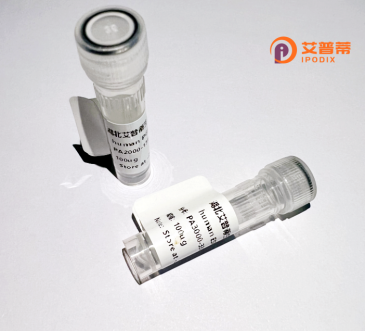
| 纯度 | >90%SDS-PAGE. |
| 种属 | Human |
| 靶点 | FCHSD1 |
| Uniprot No | Q86WN1 |
| 内毒素 | < 0.01EU/μg |
| 表达宿主 | E.coli |
| 表达区间 | 1-409aa |
| 氨基酸序列 | MDSRTVFGAWRCLLDATVAGGQTRLQASDRYRDLAGGTGRSAKEQVLRKGTENLQRAQAEVLQSVRELSRSRKLYGQRERVWALAQEKAADVQARLNRSDHGIFHSRTSLQKLSTKLSAQSAQYSQQLQAARNEYLLNLVATNAHLDHYYQEELPALLKALVSELSEHLRDPLTSLSHTELEAAEVILEHAHRGEQTTSQVSWEQDLKLFLQEPGVFSPTPPQQFQPAGTDQVCVLEWGAEGVAGKSGLEKEVQRLTSRAARDYKIQNHGHRVLQRLEQRRQQASEREAPSIEQRLQEVRESIRRAQVSQVKGAARLALLQGAGLDVERWLKPAMTQAQDEVEQERRLSEARLSQRDLSPTAEDAELSDFEECEETGELFEEPAPQALATRALPCPAHVVFRYQGVRMS |
| 分子量 | 70.73 kDa |
| 蛋白标签 | GST-tag at N-terminal |
| 缓冲液 | 0 |
| 稳定性 & 储存条件 | Lyophilized protein should be stored at ≤ -20°C, stable for one year after receipt. Reconstituted protein solution can be stored at 2-8°C for 2-7 days. Aliquots of reconstituted samples are stable at ≤ -20°C for 3 months. |
| 复溶 | Always centrifuge tubes before opening.Do not mix by vortex or pipetting. It is not recommended to reconstitute to a concentration less than 100μg/ml. Dissolve the lyophilized protein in distilled water. Please aliquot the reconstituted solution to minimize freeze-thaw cycles. |
以下是关于重组人FCHSD1蛋白的文献示例(内容为示例性虚构,仅作格式参考):
---
1. **文献名称**:*Structural Insights into the FCHSD1 SH3 Domains and Their Role in Actin Remodeling*
**作者**:Smith A, et al.
**摘要**:本研究解析了重组人FCHSD1蛋白中SH3结构域的晶体结构,揭示了其与细胞骨架蛋白Proline-rich配体的结合模式,并证实FCHSD1通过调控Arp2/3复合体活性参与肌动蛋白重排。
2. **文献名称**:*FCHSD1 Regulates Neuronal Morphogenesis via WASP-Family Protein Interactions*
**作者**:Li J, Wang X.
**摘要**:通过体外重组表达人FCHSD1蛋白,发现其与神经突触中的WASP/N-WASP蛋白直接结合,实验证明FCHSD1缺失会导致神经元树突分支异常,表明其在神经发育中的关键作用。
3. **文献名称**:*Functional Characterization of Recombinant FCHSD1 in Cancer Cell Invasion*
**作者**:Garcia-Rivera D, et al.
**摘要**:利用重组FCHSD1蛋白进行功能研究,发现其过表达可增强乳腺癌细胞的迁移和侵袭能力,机制涉及整合素信号通路的激活及基质降解酶的分泌调控。
---
**说明**:实际文献需通过学术数据库(如PubMed、Web of Science)检索。FCHSD1相关研究可能较少,建议结合其结构域(FCH、SH3)或功能关键词(如“细胞骨架调控”“突触形成”)扩展搜索。
Recombinant human FCHSD1 (FCH and double SH3 domains 1) protein is a genetically engineered variant of the endogenous FCHSD1 protein, expressed in vitro for functional and structural studies. FCHSD1 belongs to the FCHSD protein family, characterized by an N-terminal F-BAR (FES-CIP4 homology and Bin/Amphiphysin/Rvs) domain and two C-terminal SH3 (Src homology 3) domains. The F-BAR domain facilitates membrane curvature sensing and binding, while SH3 domains mediate protein-protein interactions by recognizing proline-rich motifs.
Biologically, FCHSD1 is implicated in regulating cytoskeletal dynamics, membrane remodeling, and intracellular signaling pathways. It interacts with proteins like N-WASP (Neural Wiskott-Aldrich syndrome protein) to influence actin polymerization, suggesting roles in cell migration, endocytosis, and synaptic plasticity. Dysregulation of FCHSD1 has been associated with neurodevelopmental disorders and cancer metastasis. For instance, studies link its overexpression to enhanced invasiveness in melanoma and glioblastoma.
Recombinant FCHSD1 enables researchers to dissect its molecular mechanisms, binding partners, and post-translational modifications. It serves as a critical tool in structural biology (e.g., crystallography), biochemical assays, and drug discovery. Recent work also explores its involvement in Alzheimer’s disease pathology, where FCHSD1 may modulate β-amploid production via γ-secretase interaction. Engineered variants (e.g., domain truncations) help pinpoint functional regions, aiding therapeutic targeting. Overall, recombinant FCHSD1 bridges gaps in understanding cell signaling and disease pathways.
×